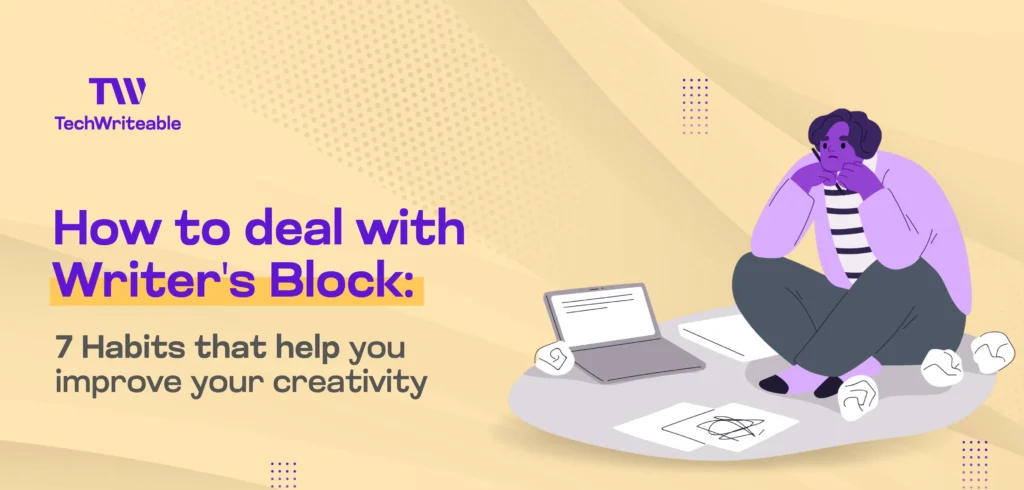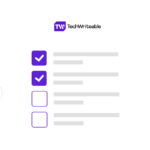Writer’s block is a common phenomenon experienced by writers worldwide. It can be easily described as when a writer cannot produce or continue a flow of thought while writing.
Writer’s block is usually associated with an overwhelming feeling of being stuck. It hinders creativity and the flow of thought from amateur to professional writers. The duration of writer’s block varies. It can last minutes, hours, days, or even years.
Fortunately, writer’s block can be overcome. This article explains writer’s block and its causes and exposes seven proven habits to help you overcome it.
What is Writer’s Block?
Simply put, writer’s block is a paralysis of mental productivity. It is where the words you need are out of reach.
Writer’s block has various forms and effects depending on the individual, but for this article, picture this. You have a project due in two days, and you turn on your PC and are ready to write. However, instead of words flowing, you stare down the blank page on your screen. The cursor blinks on your screen, your brain plays static, and you have no words just like that.
This is what writer’s block feels like.
What causes writer’s block?
There are multiple causes of writer’s block, each relative to the individual writer. For example, it can arise from a lack of confidence in one’s skills, experience, or mental fatigue. It can also be due to fear of the complexity of the assigned project.
Here’s a list of four other causes of writer’s block:
- Burnout: The more tired (physically and mentally) a writer is, the less efficient the writing. Sometimes, it can lead to a complete block of creative flow.
- Distraction: The success or failure of a writer is partly determined by the environment. If the environment is filled with things that draw the writer away from writing, it can lead to disorganized thoughts, thus causing a mental block.
- Perfectionism: Many writers are guilty of this. Trying to achieve perfection from the start overworks the brain with expectations and blocks creative flow.
- An abundance of information: Having many research materials may initially seem wonderful. However, having so much information that a writer is ready to handle can cause anxiety, which, in turn, is a mental block.
7 Proven Habits to Overcome Writer’s Block
Now that we have seen some causes of mental block, let’s look at the habits that can help writers overcome it. However, these habits are only suggestions, as individual results may vary.
1. Enhance Your Workspace.
It is important to create a workspace environment that suits you and stimulates creativity. Individual preferences vary, but whether it’s a quiet corner in your home, a library, or a coffee shop, find a space that feels right.
For example, you can adjust your room’s lighting and noise levels to suit your preferences. Personalize your workspace with items that comfort you, like music, an air conditioner, or indoor plants. Remember, the physical space around you can significantly affect your mental space.
2. Use the Pomodoro Technique.
The Pomodoro Technique is a time management method known for its unique application. It involves breaking work into 25-minute intervals, called “Pomodoros.”
To practice this technique, you set a timer and focus on a single task (writing) without distractions. Once the alarm goes off, you take a short break for about five to seven minutes. Depending on your work schedule, you can repeat this cycle for three to four hours. As each hour passes, you take longer breaks, lasting 15-30 minutes.
The Pomodoro technique is a very effective time management tool. Most importantly, it can help you maintain high concentration and break down large writing projects into manageable pieces.
3. Plan a Time and Make a Habit.
Consistency is key to overcoming writer’s block. Set aside a dedicated time for writing. The more the brain gets used to a time of day set aside to write, the easier it will be to write during that time.
First, find the time of day when you feel most creative, whether early morning, afternoon, or late night, and make it your time to write. This also means scheduling time for research and outlining before diving into the actual writing. This method makes writing focus very easy.
4. Practice Using Writing Prompts
If you still have trouble organizing your words, try writing prompts. A writing prompt is meant to center and guide your writing process. This writing habit can help you get started. It is invaluable, especially when you don’t know how to organize your thoughts.
Writing prompts kickstart the creative process as you write your first draft. They encourage you to concentrate, providing direction when finding your way through the thoughts.
Freewriting in response to a prompt can break down barriers of confusion and spark inspiration. Do not worry about perfection in these initial stages. Allow the prompt to guide the flow of ideas. It is important to understand that the first draft is just the beginning and does not have to be perfect.
5. Sleep
A good sleeping habit is a hack that always works against writer’s block. Sleep acts as a reset button for the brain, and a well-rested brain is more agile and capable of making connections faster.
Good sleep helps clear the mental clutter accumulated throughout the day, strengthens the brain, and stabilizes newly formed memories. Quality sleep improves mood, sustains health and mental resilience, and clears the frustration that writer’s block often brings. This could mean waking up with your best ideas for a writer.
6. Setting Periods To Mentally Detach
One effective way to overcome writer’s block is to stop writing. This may seem counterintuitive, but it is crucial. It involves stepping away from your work and engaging in activities like meditation or visiting friends. You should engage in activities that allow you to be introspective.
This habit also involves periodically turning off your electronic devices and putting yourself in the space to focus on things outside of work. During these times, you make room for new ideas and perspectives.
This practice ensures your next writing session is full of creative juices. Embrace these moments of detachment as crucial steps to unlocking your full creative potential.
7. Get Feedback
When you hit mental blocks, discussing aspects of your writing with peers is beneficial. It can help clear your mind. Feedback further opens up new perspectives, offers new insights, and suggests ideas that might not have occurred to you. However, it is important to note that not all feedback can be helpful.
But how can one identify good feedback? Quality feedback should spark new ideas and encourage you to consider different approaches in your writing. It can also motivate and boost your writing confidence.
Receiving constructive criticism can help you replace overthinking and improve clarity of focus. In other words, use peer feedback as a guide to new ideas and continuous improvement. This can enhance your creativity and help you overcome writer’s block.
Get Inspired by Other Writers In TechWriteable’s Community
The TW community comprises individuals who want to simplify the tech world. In the community, experts share information on how to become better tech writers. As a technical writer, you will find your tribe in the TechWriteable community.
What are we about?
The TW community is about an exchange of value. The SaaS industry is filled with articles that are too difficult for the average user to read. This leaves a communication gap between the industry and the reader. The company loses prospective clients, and the reader loses access to quality service. Everyone loses.
As thought leaders, our mission is to offer our readers clarity on the world of SaaS. We simplify our writing here to make the complex realm of SaaS accessible and understandable.
In the TechWritable community, you will learn how to research properly and simplify content. You will also learn the multiple stages of review to ensure the authenticity of articles.
We believe in the power of knowledge to transform and empower. We also ensure that each article is equipped to close the information gap between the company and the consumer.
Getting started
To join the TechWriteable community is a straightforward process. Follow the steps below to apply for a technical writer position,
- submit your resume on our online portal.
- If your resume is selected, you will be interviewed by the HR.
- Successful applicants will go through a probation period.
- Once selected, you’ll undergo a comprehensive onboarding process.
Note: The TechWriteable community offers flexible and fully remote opportunities.
Individuals can progress professionally in the team based on their performance.
Join the TechWriteable community today to write better and unlock your creativity.



